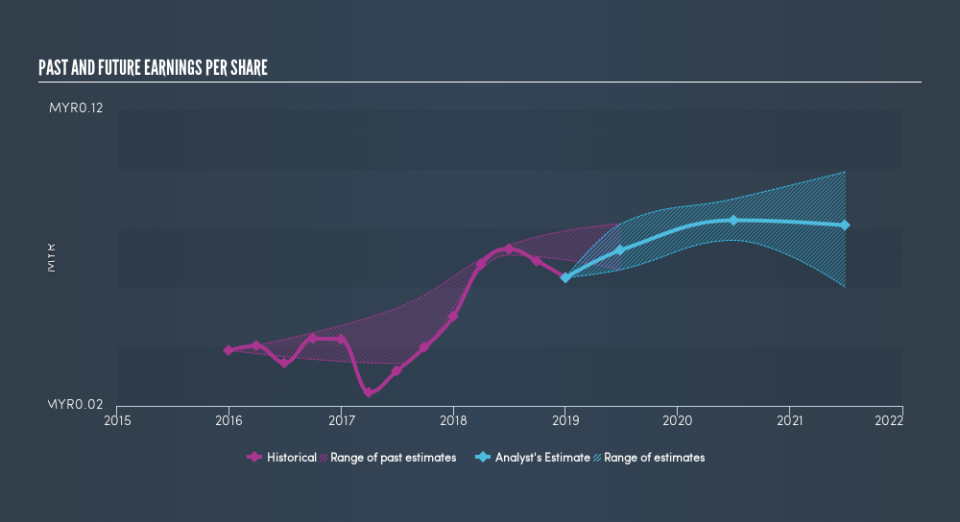Announcing: Health Management International (SGX:588) Stock Increased An Energizing 218% In The Last Five Years

When you buy a stock there is always a possibility that it could drop 100%. But on the bright side, if you buy shares in a high quality company at the right price, you can gain well over 100%. Long term Health Management International Ltd (SGX:588) shareholders would be well aware of this, since the stock is up 218% in five years. The last week saw the share price soften some 2.7%.
Check out our latest analysis for Health Management International
Want to participate in a research study? Help shape the future of investing tools and earn a $60 gift card!
While the efficient markets hypothesis continues to be taught by some, it has been proven that markets are over-reactive dynamic systems, and investors are not always rational. One imperfect but simple way to consider how the market perception of a company has shifted is to compare the change in the earnings per share (EPS) with the share price movement.
During five years of share price growth, Health Management International achieved compound earnings per share (EPS) growth of 24% per year. So the EPS growth rate is rather close to the annualized share price gain of 26% per year. That suggests that the market sentiment around the company hasn’t changed much over that time. Indeed, it would appear the share price is reacting to the EPS.
The company’s earnings per share (over time) is depicted in the image below (click to see the exact numbers).
We know that Health Management International has improved its bottom line lately, but is it going to grow revenue? If you’re interested, you could check this free report showing consensus revenue forecasts.
What About Dividends?
When looking at investment returns, it is important to consider the difference between total shareholder return (TSR) and share price return. Whereas the share price return only reflects the change in the share price, the TSR includes the value of dividends (assuming they were reinvested) and the benefit of any discounted capital raising or spin-off. Arguably, the TSR gives a more comprehensive picture of the return generated by a stock. In the case of Health Management International, it has a TSR of 229% for the last 5 years. That exceeds its share price return that we previously mentioned. This is largely a result of its dividend payments!
A Different Perspective
While the broader market lost about 2.5% in the twelve months, Health Management International shareholders did even worse, losing 14% (even including dividends). However, it could simply be that the share price has been impacted by broader market jitters. It might be worth keeping an eye on the fundamentals, in case there’s a good opportunity. On the bright side, long term shareholders have made money, with a gain of 27% per year over half a decade. It could be that the recent sell-off is an opportunity, so it may be worth checking the fundamental data for signs of a long term growth trend. Before forming an opinion on Health Management International you might want to consider these 3 valuation metrics.
But note: Health Management International may not be the best stock to buy. So take a peek at this free list of interesting companies with past earnings growth (and further growth forecast).
Please note, the market returns quoted in this article reflect the market weighted average returns of stocks that currently trade on SG exchanges.
We aim to bring you long-term focused research analysis driven by fundamental data. Note that our analysis may not factor in the latest price-sensitive company announcements or qualitative material.
If you spot an error that warrants correction, please contact the editor at editorial-team@simplywallst.com. This article by Simply Wall St is general in nature. It does not constitute a recommendation to buy or sell any stock, and does not take account of your objectives, or your financial situation. Simply Wall St has no position in the stocks mentioned. Thank you for reading.


